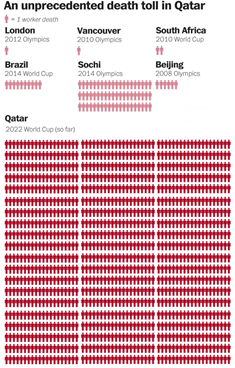Christian Kim
Brazil, as the hosts of the 2014 World Cup, had the opportunity to show the world that they could host a successful tournament. Even before Brazil’s shocking 7-1 loss to Germany, many Brazilians were already displeased with the World Cup.[1] To prepare for the tournament and the eventual 2016 Summer Olympic Games in Rio, Brazil tried to pacify their country by tearing down the drug-infested and crowded slums known as the favelas.[2] Although China, England, and South Africa used similar beautification tactics before their respective tournaments, the Brazilian government did this at an unprecedented rate and often in violation of their domestic law.[3]

For one, many Brazilians were given very little notice before these evictions and almost little to no compensation for their removals.[4] Although the World Cup and Olympic officials in Brazil claim that, “no forced evictions have been conducted… independent research by local NGOs…including Amnesty International and WITNESS have proven otherwise.”[5] An example of these evictions is in the region of Mare, home to over 130,000 working class citizens. Even though Mare is not as bad as some of Brazil’s notorious favelas, the military police ordered these residents to leave immediately.[6] Instead of being offered feasible housing alternatives, thousands of families were violently thrown out onto the street to fend for themselves.[7] As a result, many Brazilians are asking the International Olympic Committee (IOC) to address these human rights issues but the IOC has not done much.[8] A few NGOs from other countries have pushed to revoke Brazil’s Olympic hosting rights. With less than six months before the Olympics, even if Brazil were to give up hosting rights, finding a replacement would be logistically impossible. Bearing the mistakes of Brazil in mind, the international community should turn their focus to future international tournaments, such as the 2022 World Cup in Qatar, to prevent this occurrence from happening again.

Unfortunately, there seems to be a correlation with international tournaments and host nations violating human rights; however, none are as bad as Qatar’s preparations for the 2022 World Cup. The rights to host the World Cup in Qatar spurred huge infrastructure projects, at an estimated USD $100 billion.[9] In preparations for the World Cup, Qatar invited millions of migrant workers from mostly poor South and Southeast Asian nations.[10] Many of these migrant workers were lured into the country under false pretenses and have been paid substantially less than what was promised.[11] These migrant workers have also been forced to sleep in unsanitary homes and subject to harsh working conditions.[12] Studies on migrant worker’s conditions have estimated more than 1,000 accidents per year, with 10% of these workers paralyzed from the accident.[13] A shocking report from the International Trade Union Confederation has estimated that over 4,000 laborers will die during the preparations for the World Cup.[14] Despite complaints from various international organizations, the Qatari Football Association has denied these issues citing, “prejudice and racism” as reasons why the international community is criticizing Qatar’s preparations.[15]

Even if migrant workers in Qatar wanted to leave, they cannot under the kafala system. The kafala system, bars these migrant workers from leaving or changing jobs without their employers’ approval and many employers take away their passports to ensure this.[16] Without being able to change jobs or unionize for better working conditions, Qatar is essentially trapping these migrant workers into what some NGOs are calling, “modern day slavery.”[17] Qatar and their migrant worker plight was put under the international spotlight last year during the aftermath of the deveastating earthquakes in Nepal. A good portion of the migrant workers come from Nepal and many had relatives affected from the earthquake. Most, if not all Nepali migrant workers, were denied leave by their employers because of the kafala system.[18] With all of these human rights violations occurring in Qatar, many of the migrant workers are looking to FIFA for help.

Recently, many of FIFA’s top officials, including FIFA President Sepp Blatter, were arrested on corruption charges.[19] With Sepp Blatter’s resignation, there’s a chance for FIFA to make sure that the incoming officials will enforce better working conditions for the migrant workers in Qatar. One way to ensure a new generation of competent FIFA officials is to have the UN Human Rights Council observe FIFA and work hand-in-hand with Qatar’s Football Association. Since all Member States of the UN Human Rights Council (HRC) compete in the Olympics and the World Cup, they should have a vested interest in Qatar’s compliance with human rights standards.[20] The HRC’s goals are to promote and protect human rights for all.[21] The HRC has the capacity to work with international organizations, like FIFA, and the HRC can work with FIFA to set standards, monitor, and implement better working conditions for these migrant workers.[22] As one of the members of the HRC, Qatar should be held to a higher standard and ensure better working conditions for the migrant workers.

Qatar is also a member of the International Labour Organization (ILO) and even ratified the Convention on Forced Labor.[23] This convention defines forced labor as, “work or service which is exacted from any person under the menace of any penalty and for which the said person has not offered himself voluntarily.” The ILO has given examples of involuntary work such as: physical confinement in the work location, deception about types and terms of work, withholding and non-payment of wages, and retention of identity documents.[24] One of the basic principles of international law is that international agreements ought to be followed in good faith (the principle of pacta sunt servanda). As a party to the ILO and HRC, Qatar has a duty to follow the goals of these organizations by respecting and promoting these migrant worker’s human rights. If Qatar does not comply, pressure from the international community to withdraw Qatar’s hosting rights might work. Unlike the 2016 Summer Olympics in Brazil, there’s an ample amount of time to change the hosts before the 2022 World Cup. We, as the international community, have a duty to enforce international human rights obligations. If countries like Qatar play dirty off the pitch, why should the international community allow them to host the “beautiful game”?
Christian Kim is a 2L at the University of Baltimore School of Law and graduated from the University of Maryland with a Bachelor of Arts in Criminal Justice. He currently serves as the President of the Asian Pacific American Law Student Association as well as the 2L Rep for the Student Bar Association. His interests are East Asian politics, international conflicts, and human rights. Before Law School, Christian has worked for the Korean Ministry of Education as a TaLK (Teach and Learn in Korea) Scholar and Coordinator for two years. He is currently a legal intern at the Hermina Law Group and a law clerk for the Law Office of Hayley Tamburello.
[1] http://www.bbc.co.uk/sport/football/28102403
[3] http://www.theguardian.com/world/2013/dec/05/world-cup-favelas-socially-cleansed-olympics
[4] https://www.amnesty.org/en/latest/news/2011/11/brazil-forced-evictions-must-not-mar-rio-olympics/
[5] Id.
[6] http://revolution-news.com/brazil-police-evict-5-thousand-poor-people-at-gunpoint/
[7] Id.
[8] http://www.theguardian.com/world/2015/dec/08/rio-olympics-2016-human-rights-violations-report
[9] http://www.bbc.com/news/magazine-33019838
[12] https://www.hrw.org/world-report/2015/country-chapters/qatar
[14] Id.
[16] https://www.hrw.org/world-report/2015/country-chapters/qatar
[17] http://www.businessinsider.com/qatar-slavery-build-a-2022-world-cup-2013-9
[19] http://www.theatlantic.com/international/archive/2015/05/fifa-corruption-arrests/394199/
[20] http://www.ohchr.org/EN/HRBodies/HRC/Pages/HRCIndex.aspx
[21] http://www.ohchr.org/EN/AboutUs/Pages/WhatWeDo.aspx
[22] http://www.ohchr.org/EN/AboutUs/Pages/HowWeDoIt.aspx
[24] Id.

